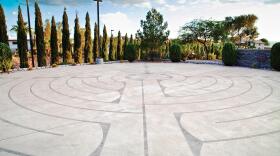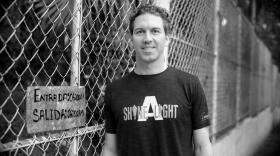Look at this guy, Troy Heard! Is he bringing it or what? Now, that’s the look of a director you can imagine slamming “The Great American Trailer Park Musical” onto a stage. Not to mention the gonzo history of “Bloody, Bloody Andrew Jackson” or “Summer Camp the Musical.” But he’s also put on “Death of a Salesman,” America’s echt tragedy. And a pared-down, updated, emotionally intense “Hamlet.” Each of which has earned him critical praise, some criticism and, for Vegas, pretty good buzz. This month he directs the black comedy “The Chalk Boy” for Cockroach Theatre, which he describes as “ Mean Girls meets David Lynch.” Obviously, Heard prefers a sense of in-betweenness: in between the fiber of art and the fluff of entertainment, between the light and dark … the kind of headspace, in other words, where Friday the 13th meets A Chorus Line and gives gleeful birth to, actual show here, “Blood Orgy of the Chainsaw Chorus Line.” “I want to do big, splashy, entertaining shows,” he says, mentioning “Oklahoma!” (with chainsaws, maybe?) and “My Fair Lady” (ditto!) “But,” partly because his mom weaned him on Nosferatu, Frankenstein and the horror classics, “I’ve never been afraid of the dark. I love the dark. It’s life. Life is death, death is life, yin and yang. It’s all together.” And, perhaps, intertwined with his work: His mother died last Christmas, he says, “and it seems like every show I’ve done this year features a death somehow. It wasn’t planned that way, but you can see a through-line.”
What drew you to “The Chalk Boy,” Troy? “The darkness,” of course — a boy has disappeared, and in the aftermath four girls examine both their own relationships and their small town’s underbelly. The “Chalk” in the title refers to the missing boy, Jeff Chalk, but also cues the play’s inventive staging: “We have to convert the entire space into a gigantic chalkboard,” Heard says. “They construct the story out of chalk, narrating as they go along.” Another thing he loves about the play: its recent vintage. “When you’re given a new script that doesn’t have a legacy, that hasn’t been done a thousand times,” he says, “you don’t feel you have to follow a stamp that’s been laid out for generations.” And if not every play can be new, many can be made new. “Death of a Salesman,” for instance. “The first thing I did was find all the humor and pull all the humor up to the surface.” Not the usual approach. Then he added innovative video sets. (He embedded video in “Hamlet,” too.) He’s clearly after a contemporaneity suitable to the existential humor that marks our culture now. “After Mel Brooks, after ‘South Park,’ no one’s safe,” he says. “The generation coming up has that sensibility. … That’s your new audience.”
“I was the kid with the VHS camera on my shoulder, making movies in my backyard,” Heard says. “But it was Georgia in the early ’80s; there wasn’t a film community.” Theater offered an alternative — plus an appealing immediacy: Hey, actors! Let’s find a space and put on a show. “I did shows in garages, dance studios, loft warehouses; wherever you could find a space, I’d put something up in there.” Fast-forward to the Vegas theater scene circa 2013, and it feels pretty familiar. It’s a small scene, lively but overlooked by the masses. “There’s a little bit of frustration in that this is the only city of this size that I’ve lived in that doesn’t have a theater community,” he says. “But it’s the yin and the yang. You’ve got talented artists here who are creating great work — they just need to find an audience.” He doesn’t necessarily blame the Strip for luring those audiences away with its bendy Cirque performers and million-dollar production values. “It’s like finding a delicious lunch at a hole-in-the-wall,” he says. “That’s what local theater is. The Strip is In-N-Out.” But who doesn’t like In-N-Out? “There’s room for both,” he insists, adding, “I’ve tried to convert colleagues to the Vegas way, tried to bring them out from the East Coast. Because you can come here and do your own thing. As long as you have the consistent quality, you can make your mark.”










